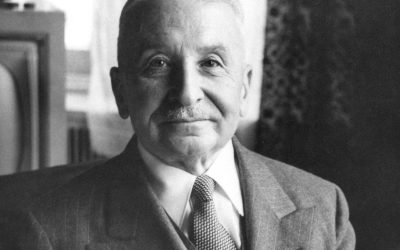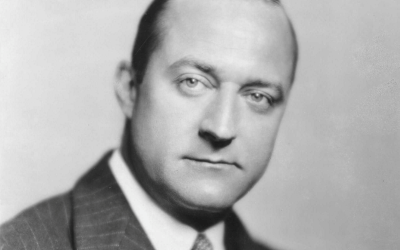A businessman cannot pay a worker more than the amount added by the work of this employee to the value of the product. He cannot pay him more than the customers are prepared to pay for the additional work of this individual worker. If he pays him more, he will not recover his expenditures from the customers. He incurs losses and, as I have pointed out again and again, and as everybody knows, a businessman who suffers losses must change his methods of business, or go bankrupt.
The economists describe this state of affairs by saying “wages are determined by the marginal productivity of labor.” This is only another expression for what I have just said before. It is a fact that the scale of wages is determined by the amount a man’s work increases the value of the product. If a man works with better and more efficient tools, then he can perform in one hour much more than a man who works one hour with less efficient instruments. It is obvious that 100 men working in an American shoe factory, equipped with the most modern tools and machines, produce much more in the same length of time than 100 shoemakers in India, who have to work with old-fashioned tools in a less sophisticated way.
The employers in all of these developing nations know very well that better tools would make their own enterprises more profitable. They would like to build more and better factories. The only thing that prevents them from doing it is the shortage of capital. The difference between the less developed and the more developed nations is a function of time: the British started to save sooner than all other nations: they also started sooner to accumulate capital and to invest it in business. Because they started sooner, there was a higher standard of living in Great Britain when, in all other European countries, there was still a lower standard of living. Gradually, all the other nations began to study British conditions, and it was not difficult for them to discover the reason for Great Britain’s wealth. So they began to imitate the methods of British business.
Since other nations started later, and since the British did not stop investing capital, there remained a large difference between conditions in England and conditions in those other countries. But something happened which caused the headstart of Great Britain to disappear.
What happened was the greatest event in the history of the nineteenth century, and this means not only in the history of an individual country. This great event was the development, in the nineteenth century, of foreign investment. In 1817, the great British economist Ricardo still took it for granted that capital could be invested only within the borders of a country. He took it for granted that capitalists would not try to invest abroad. But a few decades later, capital investment abroad began to play a most important role in world affairs.
Without capital investment it would have been necessary for nations less developed than Great Britain to start with the methods and the technology with which the British had started in the beginning and middle of the eighteenth century, and slowly, step by step–always far below the technological level of the British economy–try to imitate what the British had done.
It would have taken many, many decades for these countries to attain the standard of technological development which Great Britain had reached a hundred years or more before them. But the great event that helped all these countries was foreign investment.
Foreign investment meant that British capitalists invested British capital in other parts of the world. They first invested it in those European countries which, from the point of view of Great Britain, were short of capital and backward in their development. It is a well-known fact that the railroads of most European countries, and also of the United States, were built with the aid of British capital. You know that the same happened in this country, in Argentina.
The gas companies in all the cities of Europe were also British. In the mid 1870s, a British author and poet criticized his countrymen. He said: “The British have lost their old vigor and they have no longer any new ideas. They are no longer an important or leading nation in the world.” To which Herbert Spencer, the great sociologist, answered: “Look at the European continent. All European capitals have light because a British gas company provides them with gas.” This was, of course, in what seems to us the “remote” age of gas lighting. Further answering this British critic, Herbert Spencer added: “You say that the Germans are far ahead of Great Britain. But look at Germany. Even Berlin, the capital of the German Reich, the capital of Geist, would be in the dark if a British gas company had not invaded the country and lighted the streets.”
In the same way, British capital developed the railroads and many branches of industry in the United States. And, of course, as long as a country imports capital its balance of trade is what the noneconomists call “unfavorable.” That means that it has an excess of imports over exports. The reason for the “favorable balance of trade” of Great Britain was that the British factories sent many types of equipment to the United States, and this equipment was not paid for by anything other than shares of American corporations. This period in the history of the United States lasted, by and large, until the 1890s.
But when the United States, with the aid of British capital–and later with the aid of its own procapitalistic policies–developed its own economic system in an unprecedented way, the Americans began to buy back the capital stocks they had once sold to foreigners. Then the United States had a surplus of exports over imports. The difference was paid by the importation–by the repatriation, as one called it–of American common stock.
This period lasted until the First World War. What happened later is another story. It is the story of the American subsidies for the belligerent countries in between and after two world wars: the loans, the investments the United States made in Europe, in addition to lend-lease, foreign aid, the Marshall Plan, food that was sent overseas, and other subsidies. I emphasize this because people sometimes believe that it is shameful or degrading to have foreign capital working in their country. You have to realize that, in all countries except England, foreign capital investment played a considerable part in the development of modern industries.
If I say that foreign investment was the greatest historical event of the nineteenth century, you must think of all those things that would not have come into being if there had not been any foreign investment. All the railroads, the harbors, the factories and mines in Asia, and the Suez Canal and many other things in the Western hemisphere, would not have been constructed had there been no foreign investment.
This article is serialized from Economic Policy: Thoughts for Today and Tomorrow, a book based on six lectures delivered in Buenos Aires in 1959 on Capitalism, Socialism, Interventionism, Inflation, Foreign Investment, and Politics and Ideas by the great 20th-century economist, Ludwig von Mises (1881-1973). Copyright 1995 by Bettina Bien Greaves. All rights reserved.




